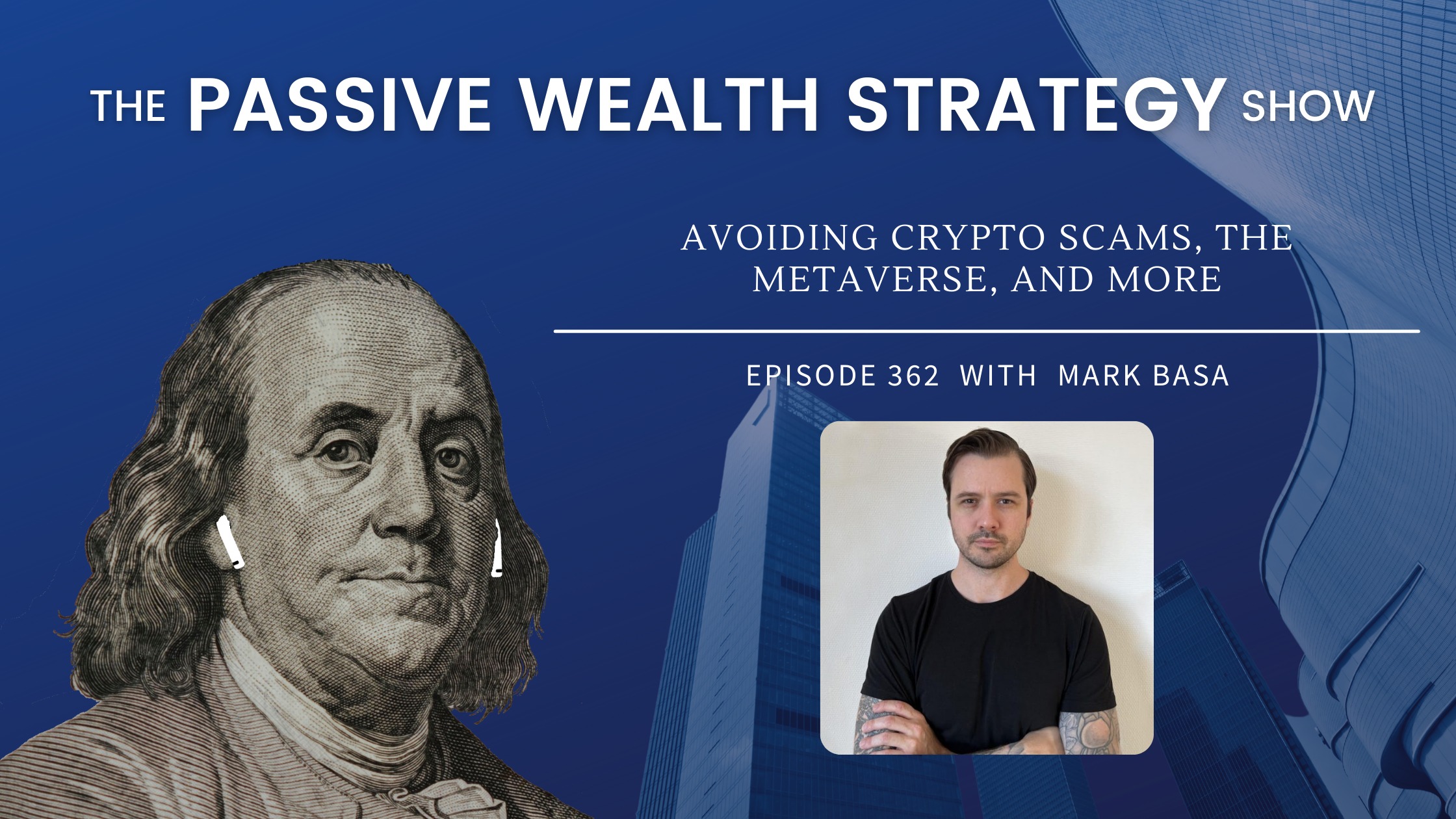
Avoiding Crypto Scams, The Metaverse, and More with Mark Basa
Mark. Thank you for joining us today.
Thank you so much. Great to be here.
Hey, it’s been a great conversation so far, but about half an hour. Great chat. And I’m sure we’re gonna have a great conversation for our listeners today for folks out there who don’t know about you and what you do. Can you tell us about your background and what you do?
Sure. So my name is marked. I’m the global brand and business manager at a meme token called hoc finance. And I predominantly was brought on board to change this cryptocurrency from a volunteer project into it, into real decentralized finance. Company. So my background in crypto is predominately in crypto brands, crypto marketing, but I first got involved around 2010, 2011 in Bitcoin where some buddies and I got together, had some crazy ideas to build an Omni currency payment gate.
Where you could spend Bitcoin fit and loyalty points in a single transaction. So going back over a decade, that was pretty crazy back then. And all the investors back then thought also we were crazy and Bitcoin was going nowhere. And that was kinda my entry point. Come 2016, 2017. I started investing in tokens.
I’ve advised them. Early-stage crypto companies, I’ve got crypto projects, myself that I’m working on as a hobby, just because I love the space. You can consider me an evangelist or crypto. As I said before, I think it’s like blockchain and crypto is like the cure and the disease to centralize banking and the financial industry, as we know it, there’s going to be a lot of ups and downs, and yeah that’s basically me.
Nice. I, the way I see Richard and central banking kind of the way I see it is. They’re going to work. They’re stuck in a trap right now, and they’re going to continue doing what they have been doing until it doesn’t work anymore. And something’s going to change. And I don’t know really, whether that’ll be positive or negative for cryptocurrencies, but I think it will be bad for paper Fiat money, 100% agree.
So this is how I see it. Is that the more money that’s put into the blockchain is less money that is owned by centralized banking. When you have your cryptocurrency that’s money that you own on an open network. For example, there are nodes set up all over the world that host a network. And if I send you money, there’s no sort of like middleman.
There’s no third party. That’s really involved in that. When you own us dollars, it still goes through our dollars. Oh, centralized banking systems. The scary part about this is that crypto is crypto has taken, some time to get this far, especially with Bitcoin accelerating 2017 or so what you have to grasp about this is that the next phase of acceleration five and 10 years is going to happen much quicker, meaning more adoption.
That means that. Eventually, there’s going to be this point, this tipping point where central banks are going to say there’s X amount of money now in blockchain, which is why we don’t have this money anymore, which is out of our control, what are they going to do? Are they just. Put interest rates up, they’re going to just add more taxes.
What are they possibly going to do? Cause if they start on any other model, I think you might find them very similar to something like Venezuela or other, other countries in a continent like Africa, where it’s like a million dollars to buy a loaf of bread. You can’t have that in Western nations.
It will collapse so fast. So the whole thing about the crypto thing. I’m in it now for the long run. And I know there’s going to be some ups and downs that the volatility will exist until the adoption takes place. I don’t know what it’s going to happen in the future. I don’t you’re right.
When you talk about the banks, not knowing what is going to happen, or maybe they do know, and maybe they’ve got some plans, they are trying to launch some stable coins some centralized currencies, but if you read their white papers, These currencies can be turned on and off. They have control over that currency.
So they’re not decentralized. They’re crypto by nature. Maybe they’re on the blockchain, but they have control over that almost as they do right now with your bank. If you may be in the future don’t abide by their policies for the way you act in certain ways. Maybe they’ll just switch off your bank account, but the cryptocurrency stops that from happening, I would say blockchain stops that from having.
In the decentralization, I think that is so there’s this talk of the central bank, digital currencies potentially coming down the road. And one of the things that people don’t talk about is to my understanding with Bitcoin, especially since it’s not a privacy coin, you can track any. Any transaction to see which wallet it went through.
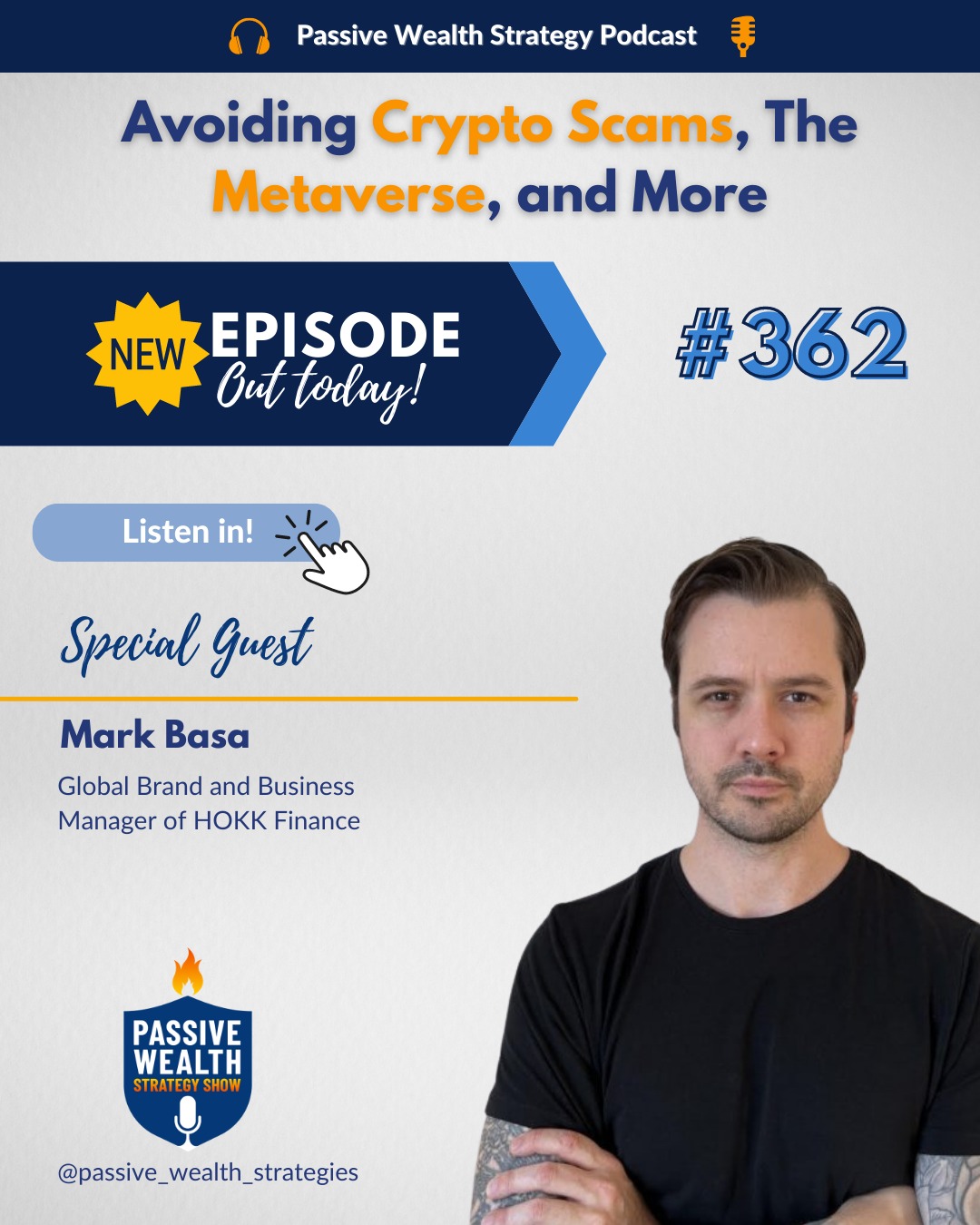
Avoiding Crypto Scams, The Metaverse, and More with Mark Basa
And now you have to know the owners of those wallets for it, any of that information to have any relevance. But if we were talking about a hypothetical central bank, digital currency, if they wanted to track, who’s doing business with whom, Hey, we find, we found this, drugs, Lord smuggler that had, was doing all these transactions.
Now we know everybody he was doing business within the central bank. Digital. Correct?
Yeah. Yeah. So the whole thing with privacy, like I’m an advocate for privacy. I think people should own their data and I don’t think it should be exploited and sold to third parties. When you opt into something like a big tech company, there is a privacy policy and most of us don’t read it when it comes to Bitcoin and the government and S and these centralized coins, Yes.
There is a benefit to having some sort of governmental control to stop the bad guys. It’s more when the bad guys are a part of the government too. And then you’re like, and you’re like, oh we’ve just given away all our power to somebody who is also a bad guy. Cause the government’s made up of people and people are good and bad.
It’s not that the government is good because it’s the government. So I would say. There’s also that thing about scammers, in crypto. Th this game is in every industry, whether it’s real estate or, a car dealer or a dodgy car salesman that they’re everywhere right now, the big spotlight is being put on crypto.
I believe it because it’s new and it’s exciting. And these things are, you could say sexy in the media to talk about because they’re controversial. Whereas if a car dealer rips off an old lady, it’s not going to make headlines. But if that car dealer had a token and then launched that token, that lady bought it.
And then she got ripped off and she couldn’t use her car anymore because of this crypto, she bought into that. Yeah,
That is one of the things I wanted to discuss with you today was, the fact of the matter is there are scams out there in any industry and I’ll openly admit that doesn’t matter what industry you’re in, they’re out there.
And crypto scams, do you get clicks these days for better or for worse? They do. And people are interested in it and wanted to dig into those and talk about it. Some underlying themes amongst these scams, or ways in which people can protect themselves and understand if they’re looking at a potential crypto investment, really see, what are the odds that this is a scam because we have seen a few and it seems to me there are some underlying themes behind them.
Great question. Spotting a scam, If it’s too good to be true, it probably is. I would say that whenever you’re going to throw your money into any project if it sounds really good and promising to invest what you can afford to lose spotting a scammer is hard. If you’ve got some, if you’re a little technical if you’re technically savvy and you know how to read blockchain wallet addresses, you can do that.
On some of these projects where you can track the wallet transactions, where they’ve been, and you can do this thing called token Nomics. Okay. So token Nomics is, if you imagine shareholders and stock if the bank of America was 25% owned by, I don’t know Walmart, you could see that information somewhere, it’s the same thing with crypto. When you’re investing in a project or a crypto company, you can see that token omics. And that’s all the different holdings of all the different owners. So maybe when they launched, they do this thing where they say 5% of our wallets or 5% of all tokens is going to advisors.
And 2% is going to the team. If you see something where it’s like 40% goes to the. I’d be like. Because what that means is that opens you up to what’s called a Rockpool. Okay. It’s pulling the rug from on your feet. So these projects that come up in the. That the team had 50% of all the tokens.
Now, if I dump all my money into this project and all the liquidity’s there and they’ve got a million bucks I can just convert those tokens in an instant on any web three wallets. And you’ll never find me again. So look out for if there are no teams. And again, it’s not to say that if they don’t have a team.
It’s funny if they don’t have a team, it doesn’t mean that they’re scams because I’ve invested in stuff and I, there are no teams and I’ve done well. How do I tell that they’re real? I haven’t lost my money yet and they’ve been around for a while. Okay. But there are some projects that just, stink.
And I think one of the things you can look at is this is the rise of. That coin has done, I don’t know, 5000000% and if you had invested a hundred dollars back in the day, I think it was January last year or the, it was may the year before you would have $700 million.
Today something ridiculous like that because of the popularity, no one knows who those people are, but I’m sure that Coinbase who’s listed them and others. These centralized exchanges have done their due diligence on who these people are. I hope so. Use your intuition use Google, use YouTube, just research, like mad, ask the right questions.
Most of the crypto companies are online. They’re pretty good at social. They use telegram and Reddit and ask all the right questions. Who are you guys? Where are you from? Where are you based who owns how much of the token supply? And that’s what, how I would look out for before throwing any money into something.
When people talk about these coins that have had huge rods, some people got in on some of these and did well and you see them, them being excited. But one of the things I prefer about real estate investing is how much more predictable our business model is large because we have control if we’re buying a property and we see that, Hey, rents appeared to be $300.
We can do these things and we believe we can either hit that $300 if be just on it, 200, 2 50, and that’s not going to produce a 5000000% return, but that does produce a healthy return and it’s predictable and we have control. And I think that’s one of my big concerns about these crypto projects in general because there are so many.
Out there that say, they make wild predictions about their potential future performance, but we can look back and see these things that did have a huge run-up, but the people that we’re buying in at the time, if we’re being honest, could not predict that it was going to do the way it did.
They hope that, but they couldn’t see it coming.
No real estate is a far safer bet. Most things in crypto long-term five, 10 years, I would say the safer bets in crypto Bitcoin and Ethereum, because of what’s happening with the world and currency, then you can make some great gains.
But I would say it’s more of a five, 10-year plan. The riskiest stuff is in the high risk, high return. It’s the. It’s these coins and tokens that don’t have too much until they have it. So what I predominately found in my career was that I came from more of a traditional digital marketing background.
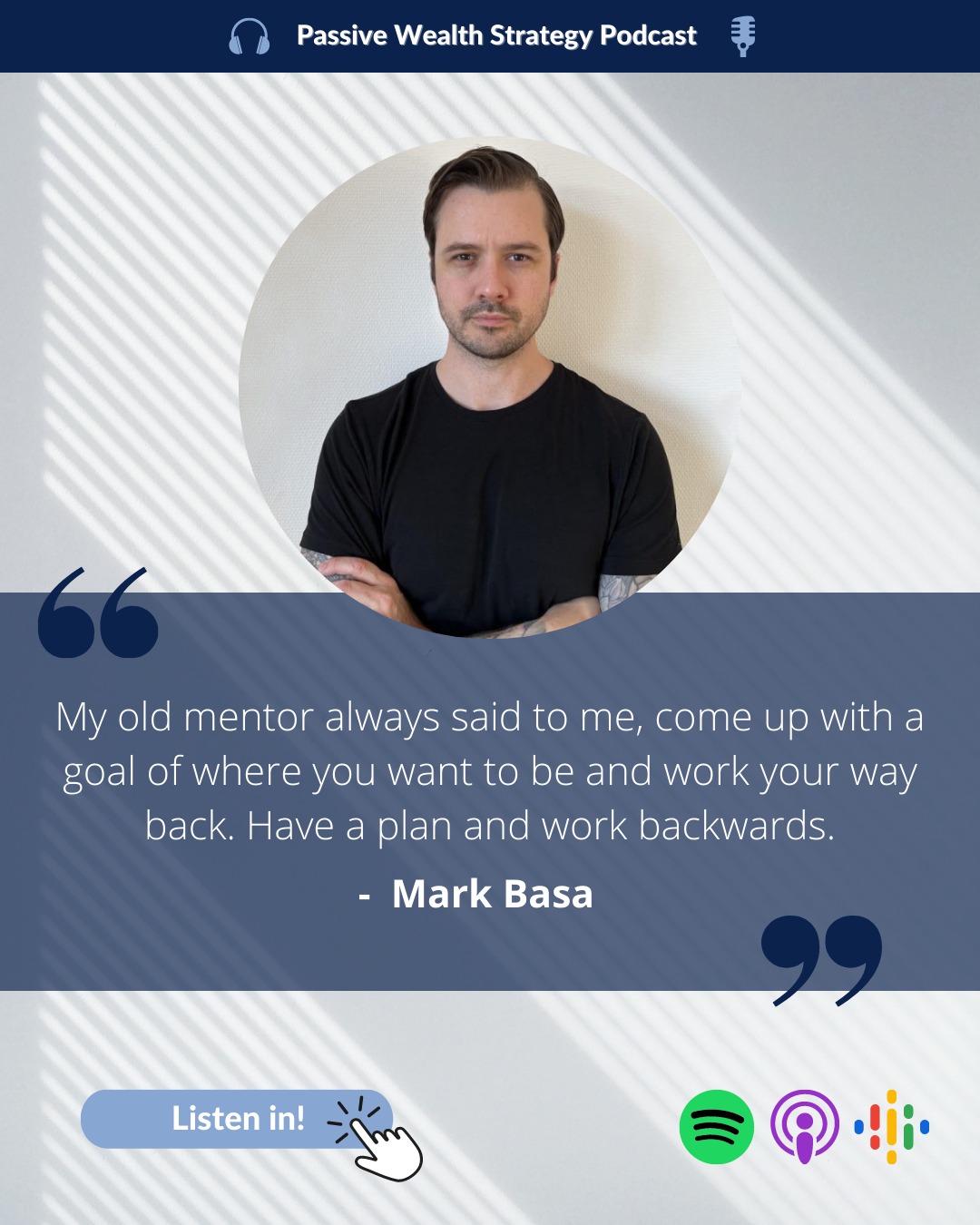
My old mentor always said to me, come up with a goal of where you want to be and work your way back. Have a plan and work backwards.
Mark Basa Tweet
And there are almost no people like this in crypto, which is why today. I would say the most in-demand people are. People who have digital marketing and traditional marketing experience, but no crypto, because in crypto companies, you’ve got super-smart nerds that don’t know how to brand themselves.
Really. They don’t know how to brand themselves, but they could like, they could put a rocket on the moon. So take that into account. Now, if you got, if you found a coin where the team was amazing and they had built some crazy technology, but they didn’t know how to market it, then all of a sudden a marketing genius came on board and said Walmart, this company can do this thing with the blockchain and it will make you millions of dollars or save you millions of dollars.
Then more mark does a partnership. The coin explodes. That’s what we’re looking at right now with cryptocurrency is that it is so volatile because there is so much unknown in the technology and the value and the benefits that you can gain from using blockchain. So some of these coins like take dogecoin with Elon Musk, One of the co-founders of PayPal.
He’s a, he’s an advocate. He believes that this is better than everything out there. Now, someone who built PayPal. Yeah. You can trust him. The wealthiest man in the world, he went against the oil giants. He started, Tesla and everything else. He’s a man you shouldn’t bet against.
So when he says that dough coin is a joke, the currency is better. People start to listen. It didn’t have much utility before he tweeted about it. And then all of this. It’s now getting it’s gaining momentum because people think, Hey, there are millions of people on social media that loved this token this coin, if a big company was to accept it, it means that price would rise.
And that’s what you have to think about getting into these tokens. Is that what potential do they have to be used in the current mainstream infrastru?
So that, that can cut both ways though. And he Ilan in particular, I believe I don’t watch Saturday night live, but I think he said something critical at one point a dogecoin on Saturday night live.
And then the price cratered, I don’t know what ended up happening, later on beyond that. But if he’s, supports it and it runs up well, he can change his mind at any time. Plus there are. Potential. And we don’t know what his underlying motivations are. So if he decides if he has dogecoin, and he’s, even though he’s the richest man in the world, he decides he wants to make a nice return. We’re never really going to know. What he did until, there’s something, some information leaked by a CPA or something like that. What I mean is that kind of MI mission is, and we could talk about this too.
How you, your company content embrace the mean thing that has risks, both ways, huge potential upside, but huge potential downside. Yup.
Yup. So that’s the thing with meme tokens in general. And this is how I started my meme token journey. I’ve invested in a bunch of coins and some of them did 20, 30, 40, 50 times what I put in and I was like, oh my God, this isn’t crazy.
And then I looked further into it and I was understanding the brand meme, tokens have a level of community support that is unfound almost anywhere else in the world. It’s like football, hooligans, mean token community members. You should see some of them. That we have on our community, our host finances, over 30,000 strong people on just the telegram.
I believe just English itself, not all the other multi-language channels we have, and people love this token, what we’re going to do with it because what we’re trying to do is bring what we call a meme. Utility meme. The utility didn’t exist when these meme tokens came out, they were started as jokes.
They were starting. Some of them were pumping dumps scams. Some of them were trying to bring utility as to what you could do with your currency. And that’s the thing. With these mean tokens on these brands is unless you can do something with them or there’s no, or there are no plans to do something with them.
Then the project can very easily fail. So when I started at Hawk, they had all these plans to do these things. And I came on board and I said, listen, what we should do. Is built a financial ecosystem where you can send and spend your crypto the way you want through several financial products and services that replicate legacy finance.
So everything that you can do today, if you want to buy a pizza, go to the movies, buy an annuity, and anything you want to do with fear currency, us dollar, you should make products and services through. And people can use your currency to do so we’re starting this whole trend of doing so now the other tokens, some have celebrity endorsement, which is what makes them pop as dogecoin others have, I don’t know what made Shiba Inu so possible.
I know that the coin, like if you look at the charts, Bye rocketed. I feel like a couple of wallets just pumped in hundreds of thousands of Ethan and just made it go wild. But besides that, all the other meme tokens that are around more or less will fail unless they are building the future of finance.
We see this popularity specifically coming from young people. They would rather buy meme tokens. Then invest in real estate or us dollar or anything. What is it about a meme token that makes it so special? Now let’s say if you have that sort of brand demand, that kind of cult following, and you can use it for good.
You can build an ecosystem and young people this next crypto generation that mind you may never interact with a central bank in their life from like my son he’s a year and eight months old. He, when he grows up, maybe the only bank he’s going to have his own decentralized web three wallets. Maybe his first transaction will be a meme token.
So we’re trying to facilitate that for the next five, 10 years for young people and more crypto evangelists and novices. So going into meme tokens and, investing in these things can go up, they can go down, they skyrocket, they go left right up down, everything. It’s important to think about, what are you in this for?
Are you in this for a pump and dump? Do you think this coin is going to explode cash out, then just cash out when you’ve got something and know what you’re going to invest in and why and what your returns ideal returns are. But if you want to invest in something you think, okay, the next five, 10 years, this is moving this way.
I’ll put a bit of money aside and see how. That’s also a good option.
So I think one of the biggest shifts that I see coming, and I’m certainly not an expert on this stuff, but I know a little bit about Bitcoin and Ethereum in particular. Ethereum is at least they’ve been saying for years, moving to a proof of stake model and that, that is progressing forward.
But in theory, I suppose that’s supposed to severely reduce the energy use of that user. Hopefully, I think bringing down transaction fees is a part of that. And I wanted before we move on here just to touch on that because. Folks out there who know maybe a little bit about crypto, but maybe more of the headlines may have this model in their minds about crypto being all just giant energy, wastage computers running at a hundred percent and, just burning off all of this power, but it’s not accurate.
And I just wanted to touch on that, while we’re here, proof of work versus.
Let’s talk about the whole idea of energy consumption. Now there’s a lot of. The bad news about crypto, especially from centralized services banks, because it’s competing with them. And every banker that I’ve known at very high levels is terrified of crypto.
They don’t know that they’re going to have a job in five and 10 years. In terms of energy consumption, you have to take, for example, you have hundreds or maybe thousands of computers supporting a network all around the world. There’s your energy to run. You can see transactions. So every time I want to send you money, if there are lots of people using the network, We have to pay I have to pay a fee.
Those fees are pretty high right now because of the demand for a theorem. As an example, if you think about traditional finance and how much money and infrastructure and people and energy that uses it’s, It’s incredible how much bigger it is than crypto, which can be sent.
Even when it’s expensive, there’s so much more energy being consumed on so many levels. Crypto companies like myself and hoc finance. We don’t have a headquarter office. We have registrations, we have headquarters, you can say, but a team of like nearly a hundred people we run on. On a laptop and we use the Ethereum, the Binance, and HECO network on the, on, on Hubie.
We’re a pretty agile company. We don’t use paper. There’s no mail clerk. There’s none of that stuff going on. You compare us to some of the bigger, or even just smaller banks. There’s a lot of energy consumption that goes into that. So I think that idea is probably spread from people that don’t want crypto to take off in terms of.
Contracts and smart contracts and not to get too deep into the technicalities. Think of it as, unless the job is done on the blockchain. You will never receive payment. And this is the big thing about proving one’s transaction or one’s work over the network. Let’s say you’re a freelance. And right now I might use Upwork for example, and Upwork holds funds from the client until the freeway freelancer delivers.
There’s a third party, there’s an intermediary. That’s holding that money, earning interest on that money, trading that money, loading that money with crypto, that doesn’t happen. You have the network, you have a decentralized that controls that transaction and releases it according to when the work is done.
Now, that’s also good and bad because then who’s going to run disputes. On these on these channels. So if you want to work, if I have an agreement with you right now, and I do some work for you, then it’s up to you and me to do something. If it doesn’t work, we get a lawyer. So that’s the part about having an identity and a team where it comes into play.
That’s also very vital. If you’re going to run into start to encrypt our transactions. I think that in terms of energy and the way it works if you have an idea about using cryptocurrency, some networks are expensive to use to send money. Some blockchains, do charge quite a hefty fee. Even if you’re not engaging on any centralized platform, like for example, Coinbase takes a fee, but meta mask, a decentralized web three wallet, I can send you money, but I’ve got to pay.
Network, in what’s called gas fees over time, it’s going to get better. It’s going to get cheaper. Other solutions will come out. But I’m hopeful for the future that again I’m not too worried about the energy costs. I don’t think that’s the biggest problem. I think that the biggest problem is going to come down to identity privacy.
And when there’s too much money in blockchain and not enough in central Africa, what’s the world going to look like then?
I don’t know. I don’t know, but we will deal with it. When it comes. Right now we’re going to take a quick break for our sponsor. All right, mark. I’ve got three questions. I asked every guest on the show.
Are you ready? I’m ready. Great. First one. What is the best investment you ever made other than in your education?
Investing in myself. I would say it was the best investment. And in terms of what I invested in, I would say seeking knowledge, not taking no for an answer, and always trying to fight for that thing that I needed to know.
So when I was doing like, I was a true believer in Bitcoin way back then, and I’m glad I was and I was pitching to investors. Very wealthy men. They also, Bitcoin was a scam. And I don’t want to say, serves you right. A decade later I was right. But the point is, I think that if you’ve got intuition, invest in yourself to learn more about your intuition and your gut instincts, I think that’s the best thing you can do to open it’ll open a lot of doors for you.
Nice. We had the best investment. Now I go to the other side of that coin, the worst investment. What is the worst investment you ever made?
The worst investment ever made was probably that thing. Again, doubting myself. I would say that coming down to intuition, you can be caught up in market trends. And when there’s a lot of bad news in the market, you want to sell early and I’ve sold early.
And I wish I didn’t and I was sold early on and I’ve lost money by selling too early instead of holding on. So I would say that was probably the worst in an investment decision.
My favorite question here at the end of the show is what is the most important lesson you’ve learned in business and investing?
My old mentor, a successful media agency owner, and a supercar phonetic and everything he’s done just about everything, a real serial entrepreneur. He always said to me, come up with a goal of where you want.
Excuse me. So if you want to be worth a hundred million dollars in five years, what do you. To actually obtain that and work your way back and have a plan and work backward. And that was an incredible piece of advice because it showed me about paths and strategies that I can help take small projects too, to becoming legitimate projects and being recognized by the press.
So have some sort of plan. I think that’s the that’s. The best thing I’ve learned is strategy is probably the most important thing. You can build a brand, you can hire CMOs, you can hire directors, but if you don’t know where you’re going, you’re never going to go.
Nice. Mark, thank you for joining us today.
We haven’t had, this is probably the second cryptocurrency conversation I’ve had on this show and probably 350 episodes by now. So a great conversation and I appreciate you joining us. If folks want to reach out, if they want to get in touch, if they want to learn more about what you’re up to or anything like that, where can they track you?
They should go to hok. finance. That’s HOKk.finance. That’s where we run our website. This month we’ve got three new products coming out FTS, an Ethereum aggregator, and a governance token. So we’ll keep a watch out for that. They can reach out on the website, telegram all the links.
Oscar MOC and Allah I’ll be there. Great.
Thanks once again for joining us today to everybody out there. Thank you for tuning in. If you’re enjoying the show, please leave us a rating and review on the apple podcast. I appreciate that so much. You guys, that helps other people learn about the show, because that helps us rank higher in the apple podcast ecosystem.
And I’m always honest with you guys that gives me a nice little warm and fuzzy feeling. Cause that gets. That you’re engaging with the content and you’re escaping of the wall street casino, along with us. If you know anyone who could use a little bit more passive wealth in their lives, please share the show with them and bring them into the tribe.
Don’t forget to subscribe and catch us here every Monday, Tuesday, and Thursday, as always. If you want to learn more about what I’m up to just go to invest with taylor.com, take the steps, and schedule a call with me. I hope you guys have a great rest of your day and we’ll talk to you on the next one.
Bye-bye.
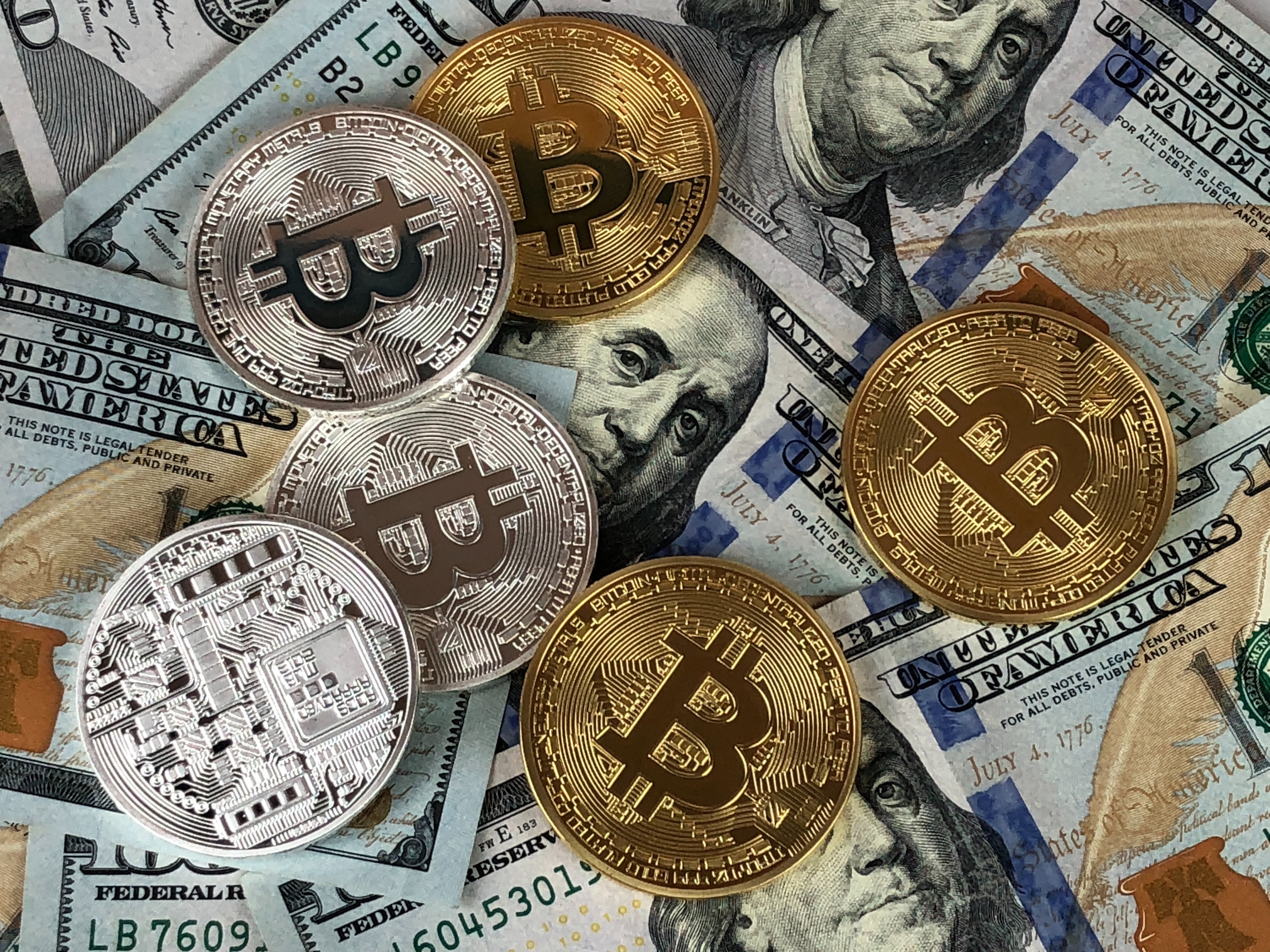
Avoiding Crypto Scams, The Metaverse, and More
About our Guest
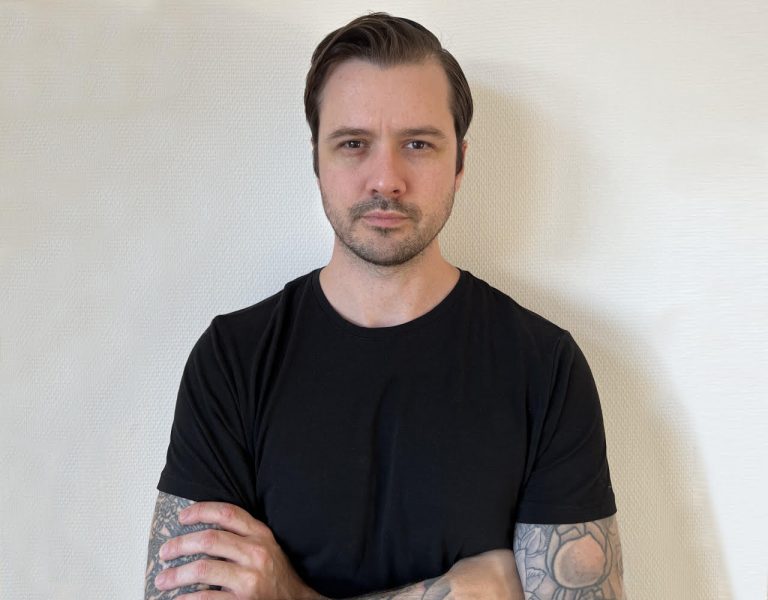
Mark Basa
Mark is the Global Brand and Business Manager at HOKK Finance. Mark joined the team as CMO in September 2021, and two months later, was appointed to lead the brand in its global expansion. Mark is an early crypto-evangelist, having being involved in Bitcoin since 2011, where he co-founded and designed an omni-currency payment gateway, enabling consumers to pay with fiat, loyalty points, and Bitcoin.
The company soon after partnered with Microsoft and the Australian government through their joint-venture innovation programs for promising technologies. Mark brings over 10 years’ experience in brands and marketing to HOKK Finance, specializing in strategic development and brand conceptualization for early-stage companies. In early 2021, he designed the brand for a decentralized, clinical trial marketplace that empowers medical and pharma companies to conduct remote studies, and rewards participants in a token. The start-up partnered with one of the largest biotech companies in the world ($10B per year revenue), as well as partnered with the fastest growing chain of medical clinics in the US, giving the project access to 200K investors on launch.
Mark will focus on building the infrastructure behind HOKK Finance, in order to scale the company in several new markets, appoint executive leadership and management to operate and oversee the brand’s daily activities, and provide product concepts and marketing campaigns for the entire brand. With his experience and knowledge in crypto, Mark is dedicated to bringing HOKK Finance into DeFi 2.0 as a leader for the next generation.
Episode Show Notes
Mark is the Global Brand and Business Manager at HOKK Finance. Mark joined the team as CMO in September 2021, and two months later, was appointed to lead the brand in its global expansion. Mark is an early crypto-evangelist, having been involved in Bitcoin since 2011, where he co-founded and designed an omni-currency payment gateway, enabling consumers to pay with fiat, loyalty points, and Bitcoin. With his experience and knowledge in crypto, Mark is dedicated to bringing HOKK Finance into DeFi 2.0 as a leader for the next generation.
[00:01 – 08:46] Opening Segment
- Get to know Mark Basa
- Mark shares how he started in cryptocurrency
- HOKK Finance: From volunteer project to real decentralized finance company
- The Future of Cryptocurrencies and Central Banking
[08:47 – 18:08] Avoiding Crypto Scams
- Bitcoin Privacy and Security
- Mark talks about government interventions
- Crypto scams and how to spot them
- Mark introduces us to tokenomics and rug pools
- Risks and predictions in real estate and crypto
[18:09 – 26:50] The Metaverse, and More
- Cryptocurrency Meme Tokens
- Mark’s cryptocurrency meme token beginnings
- How to earn with meme tokens
- Crypto Energy Consumption
[26:51 – 33:49] Closing Segment
- Quick break for our sponsors
- Groundfloor offers short-term, high-yield real estate debt investments to the general public. Check www.passivewealthstrategy.com/groundfloor/ to get started.
- What is the best investment you’ve ever made other than your education?
- Investing in himself
- Seeking knowledge, not taking ‘no’ for an answer, fighting for what you need to know
- Mark’s worst investment
- Doubting in himself
- What is the most important lesson that you’ve learned in business and investing?
- “Strategy is probably the most important thing.”
Connect with Mark Basa through Twitter, Instagram, and LinkedIn. Visit their website HOKK.Finance and be part of creating the future of crypto today for the children of tomorrow.
Invest passively in multiple commercial real estate assets such as apartments, self storage, medical facilities, hotels and more through https://www.passivewealthstrategy.com/crowdstreet/
Participate directly in real estate investment loans on a fractional basis. Go to www.passivewealthstrategy.com/groundfloor/ and get ready to invest on your own terms.
Join our Passive Investor Club for access to passive commercial real estate investment opportunities.
LEAVE A REVIEW + help someone who wants to explode their business growth by sharing this episode or click here to listen to our previous episodes
Tweetable Quotes:
“The more money that’s put into the blockchain is less money that is owned by centralized banking.” – Mark Basa
“Whenever you’re going to throw your money into any project, if it sounds really, really good and really promising, you know, invest what you can afford to lose.” – Mark Basa
“If you’ve got intuition, invest in yourself to learn more about your intuition and your gut instincts.” – Mark Basa







